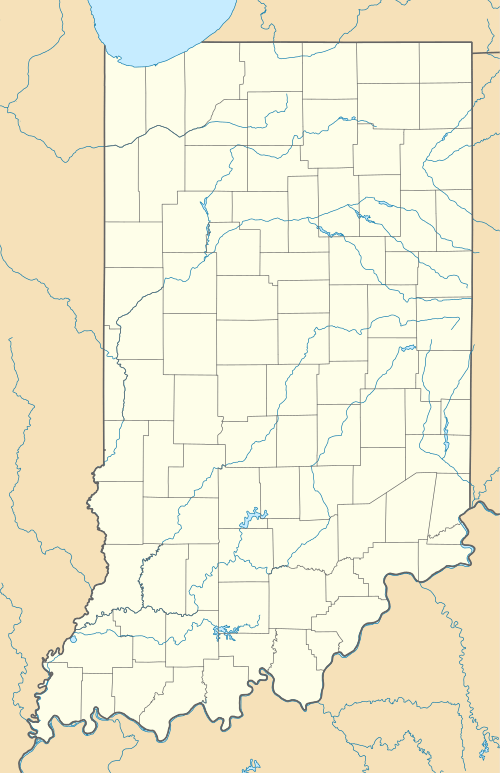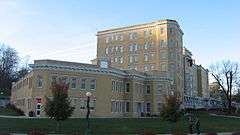French Lick Resort Casino
Coordinates: 38°33′11″N 86°37′12″W / 38.553°N 86.620°W
| French Lick Resort | |
|---|---|
|
French Lick Springs Hotel in 2011 | |
| Address |
8670 W. State 56 French Lick, Indiana |
| Opening date | 2006 |
| Theme | Las Vegas |
| Number of rooms |
443 main hotel 246 resort hotel |
| Total gaming space | 38,000 sq ft (3,500 m2) |
| Signature attractions |
Two golf courses; designed by Donald Ross (1917) & Pete Dye (2009) |
| Notable restaurants |
1875: Steakhouse Sinclair's Fine Dining |
| Casino type | Land-Based |
| Owner | Orange County Holdings |
| Website | frenchlick.com |


French Lick Resort is a resort complex in the central United States, located in the towns of West Baden and French Lick, Indiana. The 3,000-acre (12 km2) complex includes two historic resort spa hotels, stables, a casino, and three golf courses that are all part of a $500 million restoration and development project.[1][2]
Casino
The casino opened for business ten years ago on November 3, 2006, after a gaming license originally intended for Patoka Lake was transferred to French Lick. Honoring state law allowing only water-based gaming, it was originally designed as a riverboat and surrounded by a small pond (commonly nicknamed the Boat in the Moat).[3] In 2008, the moat was filled in and the casino boat was converted into the state's first land-based casino.
The casino features more than 1,300 slot machines, and table games including blackjack, craps, roulette, and poker.
French Lick Springs Hotel
The site was originally known as the French Lick Springs Hotel, a grand resort that was a mineral spring health spa. The hotel catered to guests seeking the advertised healing properties of the town's sulfur springs, three of which were on the hotel's property. William A. Bowles built and opened the first hotel on his property around 1845. Subsequent owners enlarged the original hotel, but it burned in 1897. Rebuilt and expanded on an even grander scale, especially under the ownership of Thomas Taggart, a former mayor of Indianapolis and chairman of the Democratic National Committee, the popular resort attracted many fashionable, wealthy, and notable guests.[4][5][6] In the 1920s and into the 1930s the resort became known for its recreational sports, most notably golf, but the French Lick area also had a reputation for illegal gambling. The hotel was listed on the National Register of Historic Places in 2003. The restored hotel, with its exteriors of distinctive, buff-colored brick, reopened in 2006.[7][8][9]
West Baden Springs Hotel
The historic, 243-room luxury West Baden Springs Hotel, in the adjacent town of West Baden Springs, 1 mile (1.6 km) from the French Lick Springs Hotel, is also part of the casino resort complex. The present-day West Baden hotel was built in 1902 (114 years ago) to replace an earlier hotel. The new hotel became known for the 200-foot (61 m) dome covering its atrium.[10][11] It held the title of the largest free-spanning dome in the world from 1902 to 1913, and remained the largest dome in the United States until the completerion of the Coliseum in Charlotte, North Carolina in 1955. The hotel was listed on the National Register of Historic Places in 1974, and became a National Historic Landmark in 1987.[12] It is also designated as a Historic Civil Engineering Landmark.[13] In 2008 readers of Condé Nast Traveler ranked the West Baden Springs Hotel twenty-first on its list of the top resorts on the United States mainland.[14]
Golf
The casino complex includes three golf courses: the Valley Course, the Hill Course, and the Pete Dye Golf Course at French Lick.
Beginning in the early twentieth century, when golf was gaining popularity, the French Lick hotel began to expand its modest golf facilities. Valley Course, the resort's first golf course, is adjacent to the hotel and casino. It was enlarged to an 18-hole course on 120 acres (49 hectares) around 1907. The larger course design, attributed to Tom Bendelow, featured a combination of wooded hills and flat turf.[15] It has been altered and reduced to a 9-hole course as a result of the casino construction.
Donald Ross an his associates designed the 18-hole Hill Course, the resort's second golf course, around 1917. Completed in 1920 on approximately 300 acres (120 hectares), the championship course was located about 2 miles (3.2 km) from the French Lick hotel. The course hosted the PGA Championship tournament in 1924, which Walter Hagen won.[16][17] It also hosted the LPGA Championship tournament in 1959 and 1960, and the Midwest Amateur from the 1930s through the 1950s. In 2006–07, the course was restored to its original specifications in cooperation with the Donald Ross Society.
Pete Dye, a renowned golf course designer from Indiana, designed the resort's third course. The 18-hole Pete Dye Golf Course at French Lick opened in June 2009, and hosted the PGA Professional National Championship in June 2010.[18] Mount Airie, Thomas Taggart's 1928 Colonial-style home, was purchased and transformed into a clubhouse and pro shop that overlooks much of the course. This site hosted the Senior PGA Championship in 2015.
| Tee | Rating/Slope | 1 | 2 | 3 | 4 | 5 | 6 | 7 | 8 | 9 | Out | 10 | 11 | 12 | 13 | 14 | 15 | 16 | 17 | 18 | In | Total |
|---|---|---|---|---|---|---|---|---|---|---|---|---|---|---|---|---|---|---|---|---|---|---|
| Gold | 80.0 / 148 | 519 | 413 | 641 | 251 | 391 | 513 | 611 | 213 | 532 | 4084 | 391 | 456 | 529 | 208 | 575 | 383 | 301 | 518 | 657 | 4018 | 8102 |
| Black | 76.2 / 139 | 465 | 382 | 610 | 211 | 350 | 458 | 534 | 183 | 469 | 3662 | 378 | 429 | 430 | 181 | 504 | 359 | 220 | 465 | 626 | 3592 | 7254 |
| Blue | 73.3 / 135 | 420 | 369 | 554 | 191 | 345 | 397 | 500 | 170 | 410 | 3356 | 350 | 394 | 388 | 162 | 504 | 344 | 183 | 431 | 589 | 3345 | 6701 |
| White | 70.6 / 130 | 360 | 328 | 501 | 165 | 340 | 387 | 480 | 155 | 360 | 3076 | 314 | 378 | 361 | 152 | 474 | 330 | 170 | 359 | 501 | 3039 | 6115 |
| Red | 65.4 / 118 | 314 | 289 | 442 | 122 | 271 | 315 | 421 | 111 | 326 | 2611 | 268 | 330 | 320 | 111 | 397 | 258 | 113 | 296 | 447 | 2540 | 5151 |
| Handicap | 7 | 13 | 1 | 11 | 15 | 5 | 9 | 17 | 3 | 14 | 10 | 4 | 18 | 8 | 16 | 6 | 12 | 2 | ||||
| Par | 4 | 4 | 5 | 3 | 4 | 4 | 5 | 3 | 4 | 36 | 4 | 4 | 4 | 3 | 5 | 4 | 3 | 4 | 5 | 36 | 72 |
Notes
- ↑ "French Lick Resort". Inside Indiana Business. 2008-11-03. Archived from the original on September 23, 2009.
- ↑ Marsh, Betsa (2010-09-04). "Revived Indiana Resorts Mirror Their Gilded Pasts". Dallas Morning News. Retrieved 2016-05-23.
- ↑ "Two Landmark Hotels Saved, Two Others Need Saving". Hotel Interactive. Retrieved 2008-10-15.
- ↑ Steelwater, Eliza (2002-08-15). "National Register of Historic Places Nomination Form: French Lick Springs Hotel" (pdf). United States Department of the Interior/National Park Service. pp. 12–15; 18–20; 53–56. Retrieved 2016-05-26.
- ↑ "French Lick Springs Hotel: Overview". Historic Hotels of America; National Trust for Historic Preservation. Retrieved 2016-05-24.
- ↑ Fadely, James P. (1997). Thomas Taggart: Public Servant, Political Boss: 1856-1929. Indianapolis: Indiana Historical Society. pp. xii, 57, 61, 65–68. ISBN 9780871951151.
- ↑ Fadely, pp. 74–76.
- ↑ National Park Service (2009-03-13). "National Register Information System". National Register of Historic Places. National Park Service.
- ↑ "Hotel History". French Lick Resort. Retrieved 2016-05-24.
- ↑ O'Malley, John W. (December 1958). "The Story of the West Baden Springs Hotel". Indiana Magazine of History. Bloomington: Indiana University. 54 (4): 370–72. Retrieved 2016-05-23.
- ↑ Rhodes, A. J. (1904). The Pedigree of West Baden (PDF). French Lick and West Baden, History and Story, From 1810 to 1904. pp. 8–9.
- ↑ Charleton, James H. (June 1985). "National Register of Historic Places Inventory-Nomination: West Baden Springs Hotel" (PDF). National Park Service.
- ↑ "West Baden Springs Hotel". American Society of Civil Engineers. Retrieved 2016-05-23.
- ↑ "West Baden Outranks High Profile Resorts". Inside Indiana Business. Archived from the original on September 23, 2009. Retrieved 2008-11-07.
- ↑ Steelwater, p. 58.
- ↑ Steelwater, pp. 33–36; 59–60.
- ↑ Fadely, p. 72.
- ↑ "The Pete Dye Golf Course at French Lick". IndianaGolf.com. Retrieved 2016-05-31.
References
- Fadely, James P. (1997). Thomas Taggart: Public Servant, Political Boss: 1856-1929. Indianapolis: Indiana Historical Society. ISBN 9780871951151.
- "French Lick Resort". Inside Indiana Business. 2008-11-03. Archived from the original on September 23, 2009.
- "French Lick Springs Hotel: Overview". Historic Hotels of America; National Trust for Historic Preservation. Retrieved 2016-05-24.
- "Hotel History". French Lick Resort. Retrieved 2016-05-24.
- Marsh, Betsa (2010-09-04). "Revived Indiana Resorts Mirror Their Gilded Pasts". Dallas Morning News. Retrieved 2016-05-23.
- O'Malley, John W. (December 1958). "The Story of the West Baden Springs Hotel". Indiana Magazine of History. Bloomington: Indiana University. 54 (4): 365–380. Retrieved 2016-05-23.
- Office of Code Revision Indiana Legislative Services Agency. "Riverboat Gambling," IC 35-45-5-10.
- "The Pete Dye Golf Course at French Lick". IndianaGolf.com. Retrieved 2016-05-31.
- Rhodes, A. J. (1904). The Pedigree of West Baden (PDF). French Lick and West Baden, History and Story, From 1810 to 1904.
- National Park Service (2009-03-13). "National Register Information System". National Register of Historic Places. National Park Service.
- Charleton, James H. (June 1985). "National Register of Historic Places Inventory-Nomination: West Baden Springs Hotel" (PDF). National Park Service.
- Steelwater, Eliza (2002-08-15). "National Register of Historic Places Nomination Form: French Lick Springs Hotel" (pdf). United States Department of the Interior/National Park Service. Retrieved 2016-05-26.
- Turkel, Stanley (2007-06-01). "Two Landmark Hotels Saved, Two Others Need Saving". HotelInteractive.com. Retrieved 2007-09-01.
- "West Baden Outranks High Profile Resorts". Inside Indiana Business. Archived from the original on September 23, 2009. Retrieved 2008-11-07.
- "West Baden Springs Hotel". American Society of Civil Engineers. Retrieved 2016-05-23.
